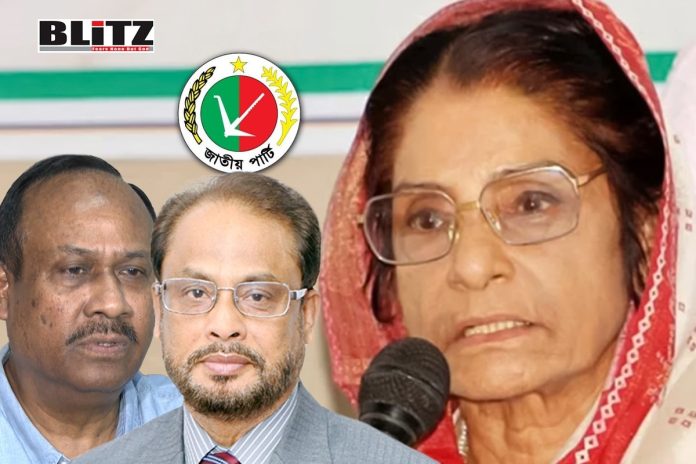In a surprising turn of events, the Jatiya Party (Japa), a dubious political party in Bangladesh, once again finds itself engulfed in a leadership crisis. Raushan Ershad, the chief patron of Jatiya Party and wife of the late founder Gen Hussain Mohammad Ershad, has declared herself as the chairman of the party and fired GM Quader and Mujibul Haque Chunnu from their posts. The battle of supremacy within the party has led to a series of reshufflings and declarations, raising questions about the future trajectory of the Jatiya Party.
The roots of the current leadership turbulence trace back to the strained relations between Raushan Ershad and GM Quader, who is the younger brother of the late Hussain Mohammad Ershad. Tensions between the two have been brewing for some time, with Roshan Ershad previously declaring herself as the chairman. However, the conflict intensified leading up to the January 7 election, in which Roshan Ershad and her son Rahgir Almahi Ershad opted not to participate. Following the election, doubts were cast on GM Quader’s leadership, further exacerbating the internal strife within the party. During the January 7 general election, GM Quader compelled the ruling Awami League in leaving Dhaka-18 seat to his wife -Sherifa Quader, although her security deposit has been forfeited as she only succeeded in bagging just six thousand votes. After such humiliating defeat despite ruling party’s blessings, Sherifa Quader reportedly has come up with newer demand on her husband for securing her position in the parliament from the quota of reserve seats.
Raushan Ershad’s announcement of her takeover as the chairman was made during a discussion meeting held at her residence in Gulshan. Citing Article 20-1 of the party’s constitution, she justified her decision to exempt GM Quader and Chunnu from their positions. This move has sparked debates and discussions within the political circles of Bangladesh, as the Jatiya Party undergoes what Raushan Ershad describes as a transitional period.
Alongside her self-proclamation as the chairman, Raushan Ershad appointed Kazi Mamunur Rashid as the general secretary of the party. This reshuffling of leadership positions has further deepened the divide within Japa. The ousted leaders, including GM Quader and Chunnu, have expressed their disapproval of these actions, highlighting the contentious nature of the internal party dynamics.
Notably, Jatiya Party Secretary General Mujibul Haque Chunnu has downplayed the significance of these developments, emphasizing that such power struggles have occurred multiple times before. He argues that these actions by Raushan Ershad and her supporters go beyond the party’s jurisdiction and may not necessarily reflect the sentiments of the broader Jatiya Party members.
Raushan Ershad acknowledged that Japa is undergoing a transitional period, and she expressed concern about the damage inflicted on the party by the previous leadership under GM Quader and Mujibul Haque Chunnu. As part of the transitional process, Kazi Mamnoor Rashid has been tasked with managing the organizational activities of the party until the next council. The future direction of Jatiya Party remains uncertain as the internal disputes continue to unfold.
During the discussion meeting, several former leaders and workers who were expelled, exempted, or voluntarily resigned from Jatiya Party voiced their support for Raushan Ershad’s leadership. Presidium member Shafiqul Islam, who was released from Japa, urged Raushan Ershad to lead the party, emphasizing the need to cleanse the party of perceived “garbage.” However, dissenting voices within the party continue to challenge the legitimacy of these leadership changes.
Amidst the leadership disorder, reports suggest that leaders left out of GM Quader-led Jatiya Party were considering forming an alliance. Speculations include the possibility of organizing under the leadership of Roshan Ershad or establishing a new political entity named ‘Trinamool Jatiya Party.’ The formation of such an alliance could reshape the political landscape in Bangladesh and add another layer of complexity to the ongoing power struggle within Japa.
The Jatiya Party’s internal dynamics have taken a dramatic turn with Raushan Ershad declaring herself as the chairman and restructuring the leadership hierarchy. The power struggle between Raushan Ershad and GM Quader has exposed the underlying tensions within the party, raising questions about its future direction. As the Jatiya Party navigates this transitional period, the political landscape in Bangladesh may witness significant shifts, with potential alliances and new political entities emerging. The coming days will be crucial in determining whether Japa can overcome its internal challenges and regain stability or if the leadership turmoil will have lasting repercussions on the party’s standing in Bangladesh’s political arena.




